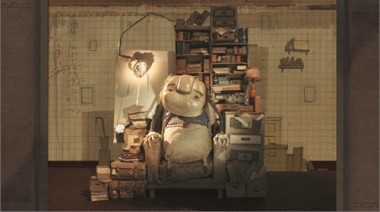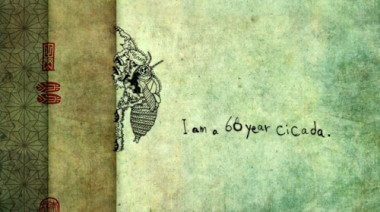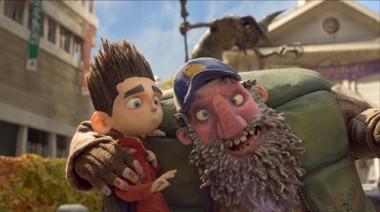Animated Encounters 2012 (Day 2)
Today starts with me infiltrating the delegate breakfast meet’n’greet, where filmmakers have congregated to network, sectioned off in pairs or small groups, while I sit on my lonesome going through my notes for my first interview of the day. I am overcome by the shameful urge to nonchalantly tiptoe up to the mountain of free croissants, snatch one and scurry back to my seat. But no. I just can’t do it. I can’t be the guy who shows up at a networking event to sit alone with his solitary continental breakfast. One day, when the last layers of shame and self-awareness have peeled off, but I’m not quite there yet.
My pastry-centric torment is cut short by the early arrival of my interview subject who I’m terrified will twig that the computer in front of me is open on his Wikipedia bio. With all the subtlety I can muster I repeatedly smash my fist into the ‘Logout’ button while we work through the small talk and proceed to have a very pleasant chat indeed (interview to be posted shortly).

“A Life Well-Seasoned” (Dir. Daniel Rieley)
The somewhat last-minute nature of the interview has warranted a schedule reshuffle and one of today’s two screenings I now won’t get to see until its Saturday repeat. The second one, “Time Passages” I do manage to catch, and from the outset I can tell it’s one where story on the whole will take a back seat to style and execution. Which isn’t necessarily a terrible thing, the only real drawback to these types of compilations being their audience is automatically narrowed to fellow practitioners more inclined to appreciate the labour involved. Certainly “12 Drawings A Day” (Enis Chapon) succeeds in that respect, with the protracted nature of its process resulting in a satisfying array of stream-of-consciousness vignettes, while Omer Ben David’s “For The Remainder” makes great use of its visual motif, one which hinges on the skeletal-brushstroke texturing of the characters. The NFB make a couple of appearances, firstly with “Muybridge’s Strings” (Koji Yamamura) painting a somewhat more inventive picture of the animation pioneer’s contribution to the medium than so many other pre-existing shorts that have simply imitated or rehashed; Later on the instantly recognizable – albeit digitised and simplified – style of Paul Driessen’s “Oedipus” harkens back to an earlier time for the NFB, going so far as to throw in cameos from the institution’s more iconic characters. This is probably the most story-driven of all the included shorts, though its title gives away an ending that takes longer to reach than necessary. What makes the film – in sound as well as visual terms – is its use of time as a force that interacts with the key characters while it reverses itself.

“Bendito Machine IV” (Dir. Jossie Malis)
The two overall charmers of the showcase are “Atlas” (Aike Arndt) – a simple but amusing and effective combination of theology, mythology and the history of the world – and “A Life Well-Seasoned” (Daniel Rieley), which combines 2D and stop-motion nicely, conveying pathos in the best way possible by not bringing it front and center and letting the audience engage with it on their own terms. From a design perspective “Bendito Machine IV” (Jossie Malis) is splendid work, though it’s a little hard to gauge whether the ecosystem-vs-technology segments are simply a theme or carry with them any specific message. Whichever way it has a perfect ending and fantastic use of colour and construction throughout. Similarly Isamu Hirabayashi’s “663114” makes superb use of sophisticated design work, and while its torturously protracted setup seems to divide the audience I find myself eventually coming round to the hypnotic nature of the cicada’s futile journey and accompanying monologue. “Go, little cicada, go! You can make it!” I enthuse internally. At least I hope it’s internally.

“663114” (Dir. Isamu Hirabayashi)
Subsequent to the competition screenings are a selection of workshops, panel discussions and retrospective screenings, the latter including longtime filmmaker Paul Bush, whose work incrementally shifts from art projects and live-action to forge an almost accidental animation career through his experimentation with pixilation, atypical stop-motion (the subject of one of his films is a specific and easily-determinable part of human anatomy) and unique approach to scratching-on-film. Also presented is “Fine Finnish Frames”, a look at animation from Finland, this year’s international focus for the festival.
An inexplicably under-promoted – though well-attended and very positively received – event is Fraser Maclean’s informal lecture on the art of layout, which serves as a perfect companion piece to his painstakingly researched book “Setting The Scene” (a Skwigly favourite). With such a wealth of territory to cover he does a masterful job of dividing the time allocated to exploring the history and development of the practice, interspersing the talk with key examples from commercials, television and feature work as well as his own backstory and firsthand anecdotal insight. It’s definitely the most high-energy presentation served up so far, and the vibe of the room once it concludes is exceedingly positive.

“ParaNorman” (LAIKA)
“ParaNorman”, a film which (despite this magazine’s coverage of late) has been at the periphery of my radar, proves to be a triumph of a gala event to close the evening. This is no mean feat for several reasons, one being the comparatively humble facilities of an arthouse-type venue such as the Arnolfini, the other being that the first ten minutes are plagued with such multitudinous sound glitches I start to worry that I might be having a stroke. Veering from indecipherably-low volume levels to bizarre sound mixes that bury the dialogue tracks in amongst the background foley, broken up by long stretches of high-frequency, teeth-shattering feedback. Once the issues are finally ironed out and our collective tinnitus has died down, it soon becomes apparent that the exposition we’ve been missing out on is fortunately fairly cut-and-dry; he’s a kid, he sees ghosts. Pretty much all you need to know to get going.
There’s lots to like about the film and it certainly gets a strong, possibly alcohol-infused response from the crowd who are eager to embrace the opportunity to appreciatively grill the attending director Sam Fell.
Capping off the evening perfectly is a non-official open-door boat party set up by the fine folks behind two of Bristol’s newer independent animation studios Rumpus and Stripeybird. One of the nicer associations with the festival is the sense of community and largely supportive indie spirit, and the vibes in both regards are strong tonight. Plus it’s always adorable to watch us animators pretend to be real people from time to time.

